新课标 Unit 6 TV programmes Gammar. 课件(牛津译林九年级上册)
文档属性
| 名称 | 新课标 Unit 6 TV programmes Gammar. 课件(牛津译林九年级上册) | 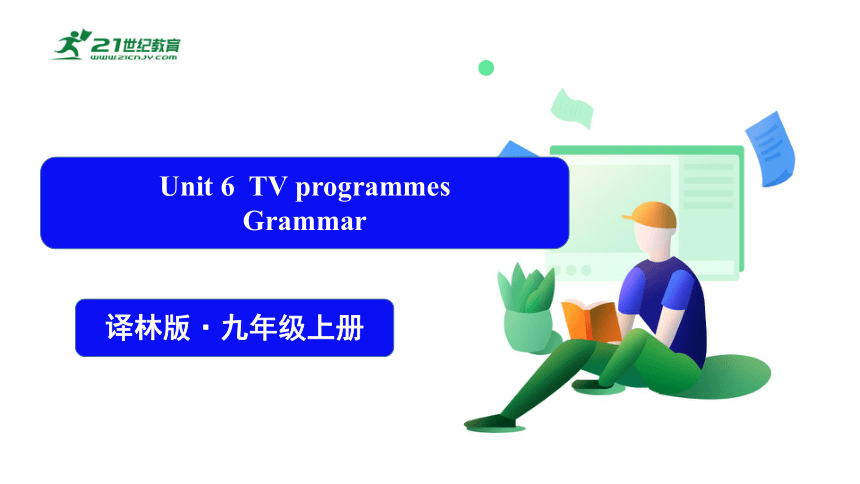 | |
| 格式 | pptx | ||
| 文件大小 | 2.7MB | ||
| 资源类型 | 试卷 | ||
| 版本资源 | 牛津译林版 | ||
| 科目 | 英语 | ||
| 更新时间 | 2023-11-06 16:27:52 | ||
图片预览

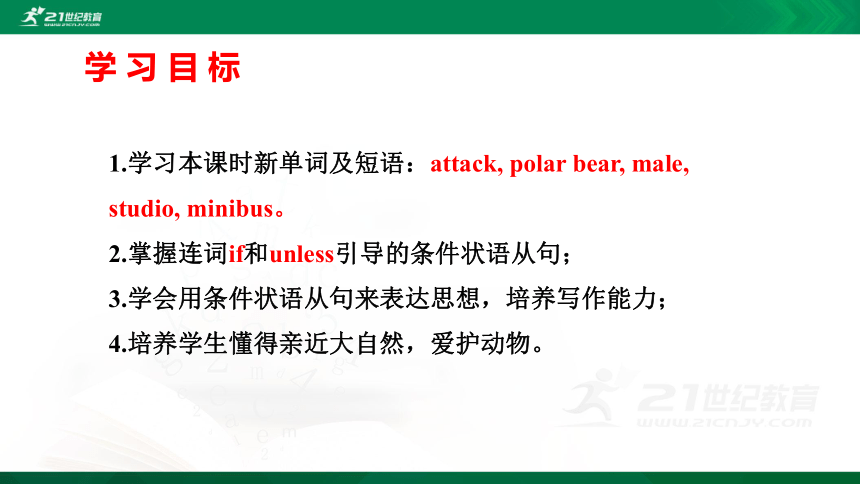
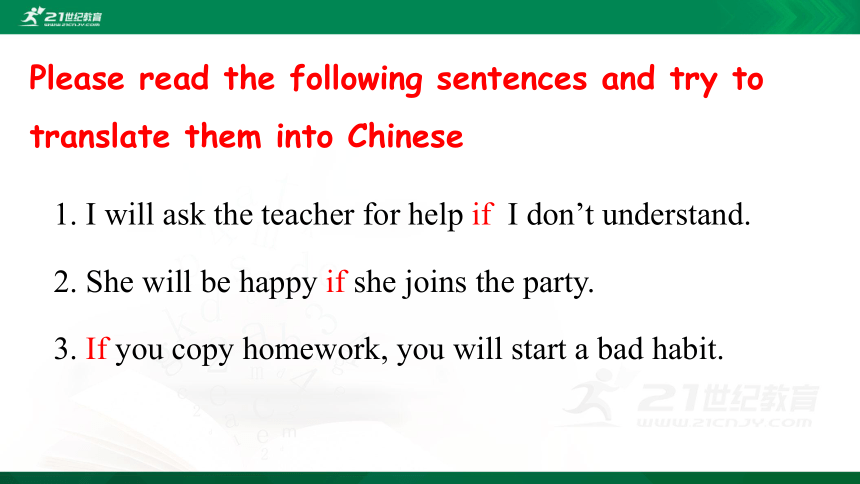
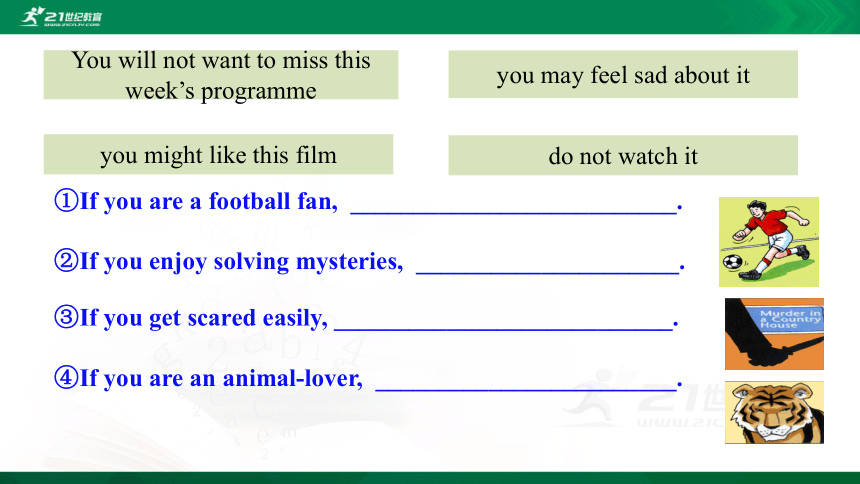
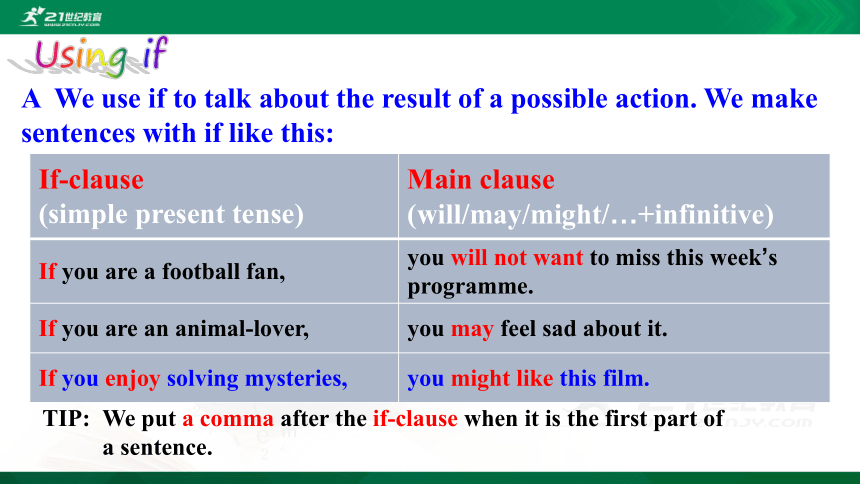
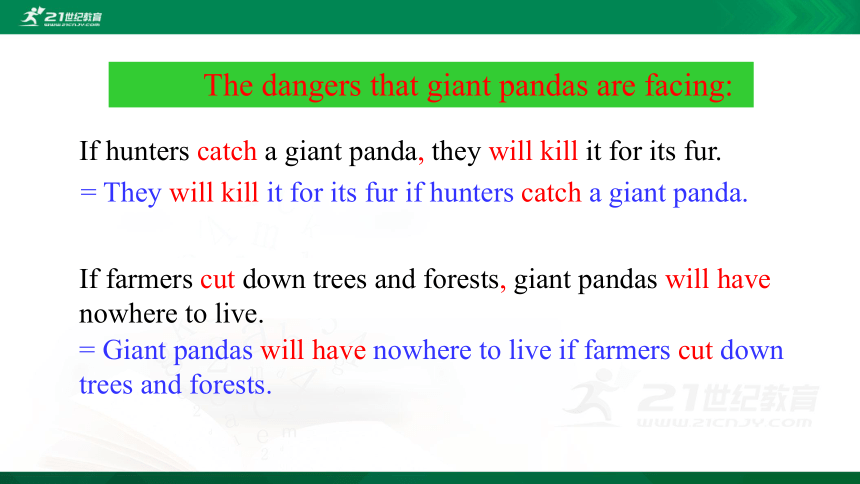
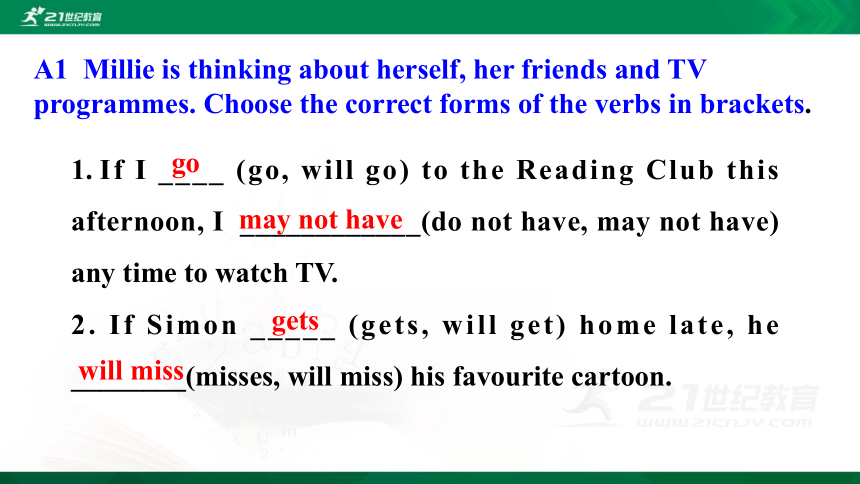
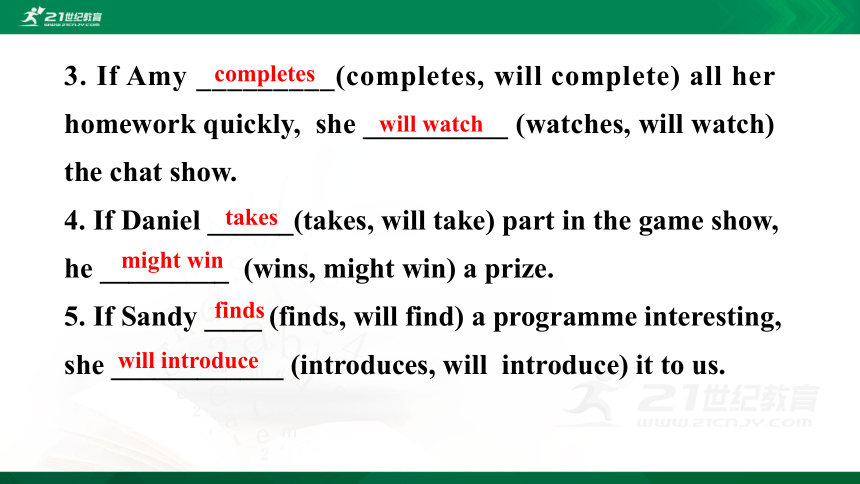
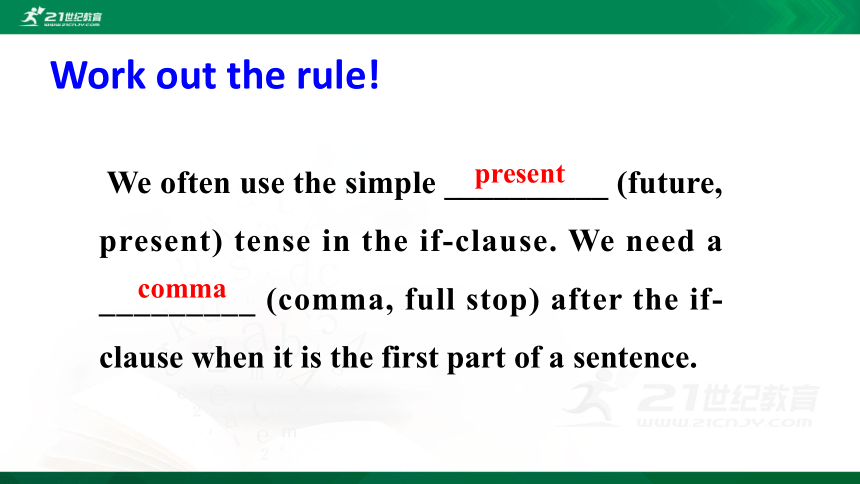
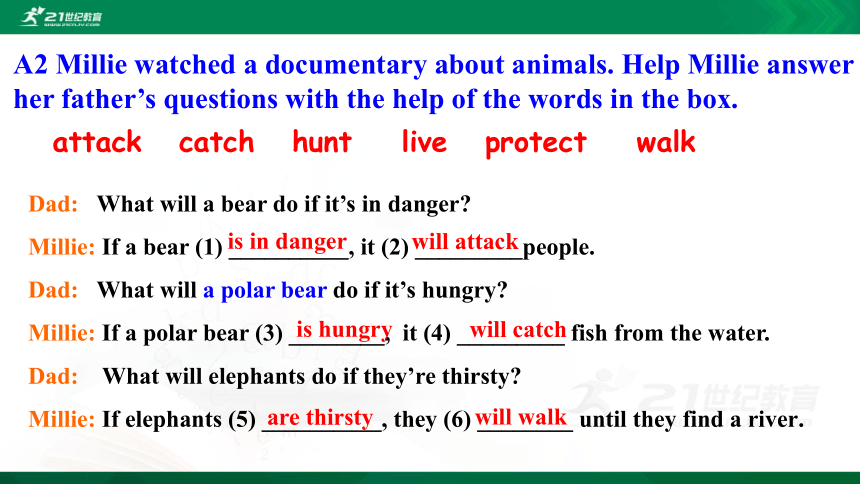
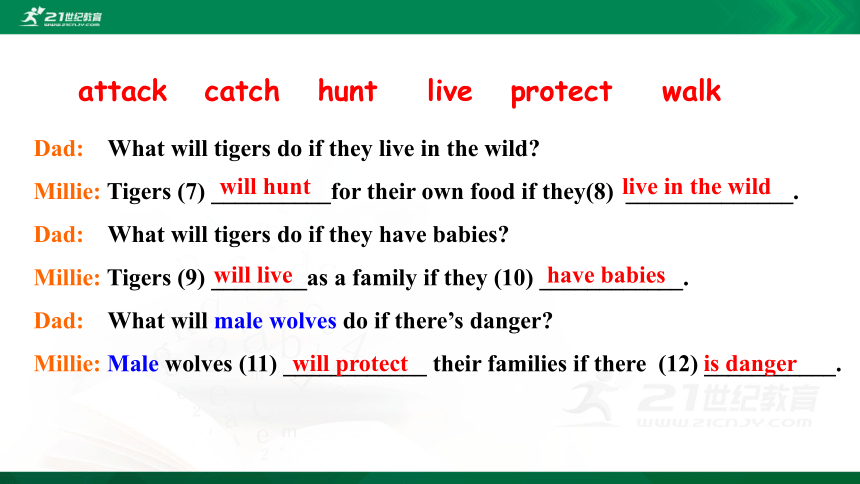
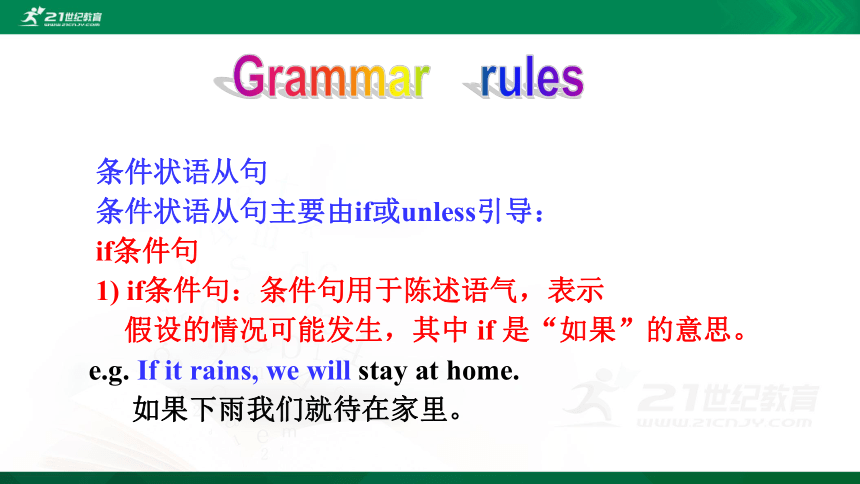
文档简介
(共30张PPT)
译林版·九年级上册
Unit 6 TV programmes
Grammar
学 习 目 标
1.学习本课时新单词及短语:attack, polar bear, male, studio, minibus。
2.掌握连词if和unless引导的条件状语从句;
3.学会用条件状语从句来表达思想,培养写作能力;
4.培养学生懂得亲近大自然,爱护动物。
3
Please read the following sentences and try to translate them into Chinese
1. I will ask the teacher for help if I don’t understand.
2. She will be happy if she joins the party.
3. If you copy homework, you will start a bad habit.
①If you are a football fan, __________________________.
②If you enjoy solving mysteries, _____________________.
You will not want to miss this week’s programme
you may feel sad about it
you might like this film
do not watch it
③If you get scared easily, ___________________________.
④If you are an animal-lover, ________________________.
A We use if to talk about the result of a possible action. We make sentences with if like this:
If-clause (simple present tense) Main clause
(will/may/might/…+infinitive)
If you are a football fan, you will not want to miss this week’s programme.
If you are an animal-lover, you may feel sad about it.
If you enjoy solving mysteries, you might like this film.
TIP: We put a comma after the if-clause when it is the first part of
a sentence.
Using if
If hunters catch a giant panda, they will kill it for its fur.
The dangers that giant pandas are facing:
If farmers cut down trees and forests, giant pandas will have nowhere to live.
= They will kill it for its fur if hunters catch a giant panda.
= Giant pandas will have nowhere to live if farmers cut down trees and forests.
If I ____ (go, will go) to the Reading Club this afternoon, I ____________(do not have, may not have) any time to watch TV.
2. If Simon _____ (gets, will get) home late, he ________(misses, will miss) his favourite cartoon.
go
may not have
gets
will miss
A1 Millie is thinking about herself, her friends and TV programmes. Choose the correct forms of the verbs in brackets.
3. If Amy _________(completes, will complete) all her homework quickly, she __________ (watches, will watch) the chat show.
4. If Daniel ______(takes, will take) part in the game show, he _________ (wins, might win) a prize.
5. If Sandy ____ (finds, will find) a programme interesting, she ____________ (introduces, will introduce) it to us.
completes
will watch
takes
might win
finds
will introduce
We often use the simple __________ (future, present) tense in the if-clause. We need a _________ (comma, full stop) after the if-clause when it is the first part of a sentence.
present
comma
Work out the rule!
Dad: What will a bear do if it’s in danger
Millie: If a bear (1) __________, it (2) _________people.
Dad: What will a polar bear do if it’s hungry
Millie: If a polar bear (3) ________, it (4) _________ fish from the water.
Dad: What will elephants do if they’re thirsty
Millie: If elephants (5) __________, they (6) ________ until they find a river.
is in danger
will attack
is hungry
will catch
A2 Millie watched a documentary about animals. Help Millie answer her father’s questions with the help of the words in the box.
are thirsty
will walk
attack catch hunt live protect walk
Dad: What will tigers do if they live in the wild
Millie: Tigers (7) __________for their own food if they(8) ______________.
Dad: What will tigers do if they have babies
Millie: Tigers (9) ________as a family if they (10) ____________.
Dad: What will male wolves do if there’s danger
Millie: Male wolves (11) ____________ their families if there (12) ___________.
will live
have babies
will protect
is danger
will hunt
live in the wild
attack catch hunt live protect walk
条件状语从句
条件状语从句主要由if或unless引导:
if条件句
1) if条件句:条件句用于陈述语气,表示
假设的情况可能发生,其中 if 是“如果”的意思。
e.g. If it rains, we will stay at home.
如果下雨我们就待在家里。
Grammar rules
2) 用法:
(1)条件状语从句通常由连词if引导,意为“如果、假如”,主句不能用be going to表示将来,而应该用shall, will。
e.g. If you leave now, you will never regret it.
如果你现在离开,你永远都不会后悔。
(2)if “如果”,引导条件状语从句,主句用一般将来时,从句则用一般现在时。(主将从现)
e.g. If it rains tomorrow, I shan’t climb the hills.
如果明天下雨,我就不爬山了。
(3)主句是祈使句或含有情态动词,从句也用一般现在时。
e.g. Please call me if he comes next Sunday.
如果他下周日过来请打电话给我。
注意: 宾语从句中的if与条件状语从句if的区别。宾语从句中的if “是否”相当于 whether, 引导宾语从句, 时态需根据语境确定。如果主句用一般现在时, 从句可以根据具体情况选用时态, 如果主句用一般过去时, 从句必须用过去时的某种形式。
if引导条件状语从句
主句 if 从句
①一般将来时
②情态动词 + 动词原形
③祈使句
一般现在时
(动词用原形或三单)
Summary
She will listen to music if she doesn’t have housework to do.
She will listen to music __________
she ______ housework to do.
unless
has
Using unless
We can use unless to say that something can only happen or be true in a particular situation.
He won’t come to the party unless you invite him.
Sometimes we can use if ... not to replace unless.
The situation will continue unless humans stop hunting them for their fur and bones.
→ The situation will continue if humans do not stop hunting them for their fur and bones.
Unless it rains tomorrow, we are going to play football in the park.
→ If it does not rain tomorrow, we are going to play football in the park.
I will not go _____he _______telephone .
1. 除非你尽力了,否则你将不会实现梦想。
_____ you try your best, you won’t realize your dream.
2.你马上离开就不会迟到。
You will be late ______ you leave right now.
3.除非他打电话我,否则我就不去.
I will not go ________he telephones .
4.不要离开房子除非我叫你离开.
Don’t leave the house ______I tell you to .
Don’t leave the house ____I _____ tell you to.
Unless
unless
unless
unless
if
doesn’t
if
don’t
if 与unless 转换
The unless-clause can come first or after the main clause.
Unless you try your best, you will not realize your dream.
You will be late unless you leave right now.
1. Unless the weather report says it is going to rain,
2. We will arrive at the studio around 9:30 a.m.,
3. Unless you already know the studio very well,
4. You will buy your lunch at the restaurants in the studio,
5. Unless you are tired,
6. You will have a chance to see how a TV programme is recorded,
a. unless you take your own
food with you.
b. you will not need to take
the minibus in the studio.
you will not have to take
an umbrella with you.
unless the traffic is very
heavy.
unless you have little
interest in it.
you will travel around it
with a tour guide.
Help Sandy match the two parts of the sentences
Work out the rule!
We use the simple__________(future ,present) tense in the unless-clause.
present
unless 引导的条件状语从句
unless引导条件状语从句,意为 “除非……”“如果……不”。
1. unless从句可以放在句首,也可位于主句之后。
2. unless 可以与if…not 互换。
3. 时态搭配同 if 用法。
Grammar rules
Summary
主句 从句
一般般将来时
祈使句
情态动词+动词原形
+if/unless + 一般现在时
unless = if .. .not
Language points
Unless you have little interest in it 除非你对它几乎没有兴趣
have interest in sth./doing sth. 意为“对… …有兴趣” ,相当于show (an) interest in 或be interested in。
He had much interest in playing the piano when he was very young.
= He became /was interested in playing the piano when he was very young.
=He showed a great interest in playing the piano when he was very young.他很小的时候就对弹钢琴感兴趣。
当 堂 训 练
1. If he hard, he will get good grades.
A. study B. studies C. will study D. studied
2. I want to know if Mary to the party tomorrow.
A. go B. went C. will go D. goes
3. If he comes late, he will miss the train.
A. and B. so C. / D. or
4. Mary will go to Sanya if she a five-day trip.
A. have B. had C. will have D. has
B
D
D
C
单项选择
根据汉语意思完成句子。
1. 如果Max没准时来,我们就不等他先走。
If Max ____________on time, we _________without him.
We _________without him _______Max comes on time.
2. 如果没有你的帮助,我将不能完成这份工作。
I ____________this work if you don’t help me.
I won’t finish this work ________you help me.
3. 如果你现在不走,你就赶不上火车了。
If you _______ _______now, you _______ _______ the train.
= _______ _______ _______ now, you _______ _______ the train.
doesn’t come
will leave
unless
won’t finish
unless
will leave
don't leave
won't catch
Unless you leave
won't catch
1. Revise Grammar and finish the exercises.
2. Preview Integrated skills.
Preview the words and read through the notes.
Homework
谢谢
21世纪教育网(www.21cnjy.com)
中小学教育资源网站
兼职招聘:
https://www.21cnjy.com/recruitment/home/admin
译林版·九年级上册
Unit 6 TV programmes
Grammar
学 习 目 标
1.学习本课时新单词及短语:attack, polar bear, male, studio, minibus。
2.掌握连词if和unless引导的条件状语从句;
3.学会用条件状语从句来表达思想,培养写作能力;
4.培养学生懂得亲近大自然,爱护动物。
3
Please read the following sentences and try to translate them into Chinese
1. I will ask the teacher for help if I don’t understand.
2. She will be happy if she joins the party.
3. If you copy homework, you will start a bad habit.
①If you are a football fan, __________________________.
②If you enjoy solving mysteries, _____________________.
You will not want to miss this week’s programme
you may feel sad about it
you might like this film
do not watch it
③If you get scared easily, ___________________________.
④If you are an animal-lover, ________________________.
A We use if to talk about the result of a possible action. We make sentences with if like this:
If-clause (simple present tense) Main clause
(will/may/might/…+infinitive)
If you are a football fan, you will not want to miss this week’s programme.
If you are an animal-lover, you may feel sad about it.
If you enjoy solving mysteries, you might like this film.
TIP: We put a comma after the if-clause when it is the first part of
a sentence.
Using if
If hunters catch a giant panda, they will kill it for its fur.
The dangers that giant pandas are facing:
If farmers cut down trees and forests, giant pandas will have nowhere to live.
= They will kill it for its fur if hunters catch a giant panda.
= Giant pandas will have nowhere to live if farmers cut down trees and forests.
If I ____ (go, will go) to the Reading Club this afternoon, I ____________(do not have, may not have) any time to watch TV.
2. If Simon _____ (gets, will get) home late, he ________(misses, will miss) his favourite cartoon.
go
may not have
gets
will miss
A1 Millie is thinking about herself, her friends and TV programmes. Choose the correct forms of the verbs in brackets.
3. If Amy _________(completes, will complete) all her homework quickly, she __________ (watches, will watch) the chat show.
4. If Daniel ______(takes, will take) part in the game show, he _________ (wins, might win) a prize.
5. If Sandy ____ (finds, will find) a programme interesting, she ____________ (introduces, will introduce) it to us.
completes
will watch
takes
might win
finds
will introduce
We often use the simple __________ (future, present) tense in the if-clause. We need a _________ (comma, full stop) after the if-clause when it is the first part of a sentence.
present
comma
Work out the rule!
Dad: What will a bear do if it’s in danger
Millie: If a bear (1) __________, it (2) _________people.
Dad: What will a polar bear do if it’s hungry
Millie: If a polar bear (3) ________, it (4) _________ fish from the water.
Dad: What will elephants do if they’re thirsty
Millie: If elephants (5) __________, they (6) ________ until they find a river.
is in danger
will attack
is hungry
will catch
A2 Millie watched a documentary about animals. Help Millie answer her father’s questions with the help of the words in the box.
are thirsty
will walk
attack catch hunt live protect walk
Dad: What will tigers do if they live in the wild
Millie: Tigers (7) __________for their own food if they(8) ______________.
Dad: What will tigers do if they have babies
Millie: Tigers (9) ________as a family if they (10) ____________.
Dad: What will male wolves do if there’s danger
Millie: Male wolves (11) ____________ their families if there (12) ___________.
will live
have babies
will protect
is danger
will hunt
live in the wild
attack catch hunt live protect walk
条件状语从句
条件状语从句主要由if或unless引导:
if条件句
1) if条件句:条件句用于陈述语气,表示
假设的情况可能发生,其中 if 是“如果”的意思。
e.g. If it rains, we will stay at home.
如果下雨我们就待在家里。
Grammar rules
2) 用法:
(1)条件状语从句通常由连词if引导,意为“如果、假如”,主句不能用be going to表示将来,而应该用shall, will。
e.g. If you leave now, you will never regret it.
如果你现在离开,你永远都不会后悔。
(2)if “如果”,引导条件状语从句,主句用一般将来时,从句则用一般现在时。(主将从现)
e.g. If it rains tomorrow, I shan’t climb the hills.
如果明天下雨,我就不爬山了。
(3)主句是祈使句或含有情态动词,从句也用一般现在时。
e.g. Please call me if he comes next Sunday.
如果他下周日过来请打电话给我。
注意: 宾语从句中的if与条件状语从句if的区别。宾语从句中的if “是否”相当于 whether, 引导宾语从句, 时态需根据语境确定。如果主句用一般现在时, 从句可以根据具体情况选用时态, 如果主句用一般过去时, 从句必须用过去时的某种形式。
if引导条件状语从句
主句 if 从句
①一般将来时
②情态动词 + 动词原形
③祈使句
一般现在时
(动词用原形或三单)
Summary
She will listen to music if she doesn’t have housework to do.
She will listen to music __________
she ______ housework to do.
unless
has
Using unless
We can use unless to say that something can only happen or be true in a particular situation.
He won’t come to the party unless you invite him.
Sometimes we can use if ... not to replace unless.
The situation will continue unless humans stop hunting them for their fur and bones.
→ The situation will continue if humans do not stop hunting them for their fur and bones.
Unless it rains tomorrow, we are going to play football in the park.
→ If it does not rain tomorrow, we are going to play football in the park.
I will not go _____he _______telephone .
1. 除非你尽力了,否则你将不会实现梦想。
_____ you try your best, you won’t realize your dream.
2.你马上离开就不会迟到。
You will be late ______ you leave right now.
3.除非他打电话我,否则我就不去.
I will not go ________he telephones .
4.不要离开房子除非我叫你离开.
Don’t leave the house ______I tell you to .
Don’t leave the house ____I _____ tell you to.
Unless
unless
unless
unless
if
doesn’t
if
don’t
if 与unless 转换
The unless-clause can come first or after the main clause.
Unless you try your best, you will not realize your dream.
You will be late unless you leave right now.
1. Unless the weather report says it is going to rain,
2. We will arrive at the studio around 9:30 a.m.,
3. Unless you already know the studio very well,
4. You will buy your lunch at the restaurants in the studio,
5. Unless you are tired,
6. You will have a chance to see how a TV programme is recorded,
a. unless you take your own
food with you.
b. you will not need to take
the minibus in the studio.
you will not have to take
an umbrella with you.
unless the traffic is very
heavy.
unless you have little
interest in it.
you will travel around it
with a tour guide.
Help Sandy match the two parts of the sentences
Work out the rule!
We use the simple__________(future ,present) tense in the unless-clause.
present
unless 引导的条件状语从句
unless引导条件状语从句,意为 “除非……”“如果……不”。
1. unless从句可以放在句首,也可位于主句之后。
2. unless 可以与if…not 互换。
3. 时态搭配同 if 用法。
Grammar rules
Summary
主句 从句
一般般将来时
祈使句
情态动词+动词原形
+if/unless + 一般现在时
unless = if .. .not
Language points
Unless you have little interest in it 除非你对它几乎没有兴趣
have interest in sth./doing sth. 意为“对… …有兴趣” ,相当于show (an) interest in 或be interested in。
He had much interest in playing the piano when he was very young.
= He became /was interested in playing the piano when he was very young.
=He showed a great interest in playing the piano when he was very young.他很小的时候就对弹钢琴感兴趣。
当 堂 训 练
1. If he hard, he will get good grades.
A. study B. studies C. will study D. studied
2. I want to know if Mary to the party tomorrow.
A. go B. went C. will go D. goes
3. If he comes late, he will miss the train.
A. and B. so C. / D. or
4. Mary will go to Sanya if she a five-day trip.
A. have B. had C. will have D. has
B
D
D
C
单项选择
根据汉语意思完成句子。
1. 如果Max没准时来,我们就不等他先走。
If Max ____________on time, we _________without him.
We _________without him _______Max comes on time.
2. 如果没有你的帮助,我将不能完成这份工作。
I ____________this work if you don’t help me.
I won’t finish this work ________you help me.
3. 如果你现在不走,你就赶不上火车了。
If you _______ _______now, you _______ _______ the train.
= _______ _______ _______ now, you _______ _______ the train.
doesn’t come
will leave
unless
won’t finish
unless
will leave
don't leave
won't catch
Unless you leave
won't catch
1. Revise Grammar and finish the exercises.
2. Preview Integrated skills.
Preview the words and read through the notes.
Homework
谢谢
21世纪教育网(www.21cnjy.com)
中小学教育资源网站
兼职招聘:
https://www.21cnjy.com/recruitment/home/admin
